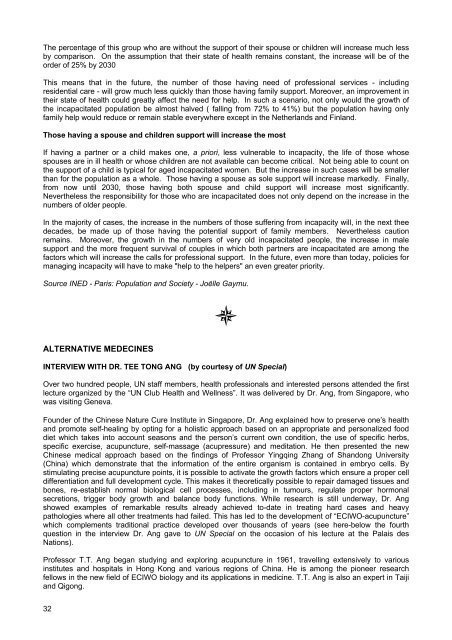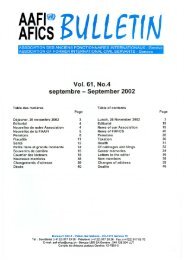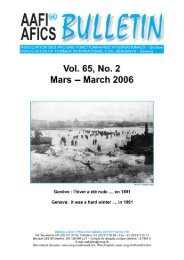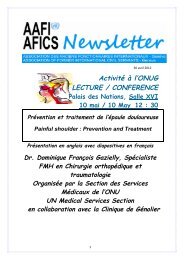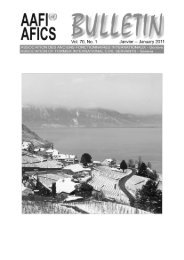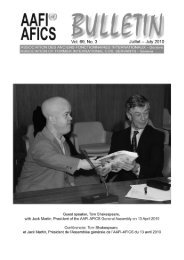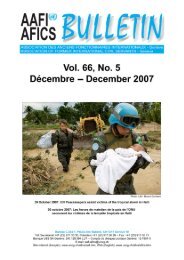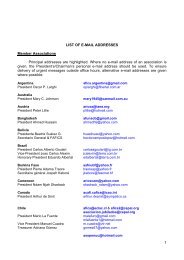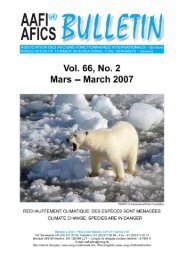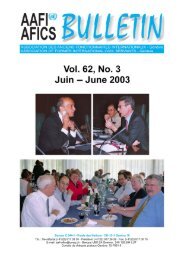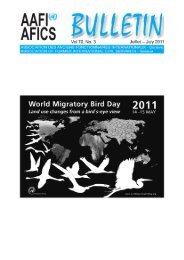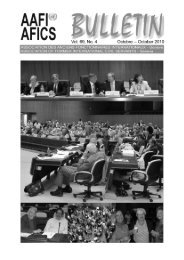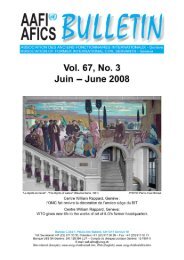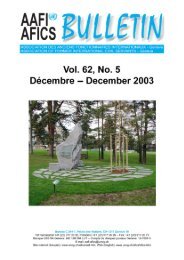VOL. 68, NO. 2 - AAFI-AFICS, Geneva - UNOG
VOL. 68, NO. 2 - AAFI-AFICS, Geneva - UNOG
VOL. 68, NO. 2 - AAFI-AFICS, Geneva - UNOG
You also want an ePaper? Increase the reach of your titles
YUMPU automatically turns print PDFs into web optimized ePapers that Google loves.
The percentage of this group who are without the support of their spouse or children will increase much less<br />
by comparison. On the assumption that their state of health remains constant, the increase will be of the<br />
order of 25% by 2030<br />
This means that in the future, the number of those having need of professional services - including<br />
residential care - will grow much less quickly than those having family support. Moreover, an improvement in<br />
their state of health could greatly affect the need for help. In such a scenario, not only would the growth of<br />
the incapacitated population be almost halved ( falling from 72% to 41%) but the population having only<br />
family help would reduce or remain stable everywhere except in the Netherlands and Finland.<br />
Those having a spouse and children support will increase the most<br />
If having a partner or a child makes one, a priori, less vulnerable to incapacity, the life of those whose<br />
spouses are in ill health or whose children are not available can become critical. Not being able to count on<br />
the support of a child is typical for aged incapacitated women. But the increase in such cases will be smaller<br />
than for the population as a whole. Those having a spouse as sole support will increase markedly. Finally,<br />
from now until 2030, those having both spouse and child support will increase most significantly.<br />
Nevertheless the responsibility for those who are incapacitated does not only depend on the increase in the<br />
numbers of older people.<br />
In the majority of cases, the increase in the numbers of those suffering from incapacity will, in the next thee<br />
decades, be made up of those having the potential support of family members. Nevertheless caution<br />
remains. Moreover, the growth in the numbers of very old incapacitated people, the increase in male<br />
support and the more frequent survival of couples in which both partners are incapacitated are among the<br />
factors which will increase the calls for professional support. In the future, even more than today, policies for<br />
managing incapacity will have to make "help to the helpers" an even greater priority.<br />
Source INED - Paris: Population and Society - Joëlle Gaymu.<br />
ALTERNATIVE MEDECINES<br />
INTERVIEW WITH DR. TEE TONG ANG (by courtesy of UN Special)<br />
Over two hundred people, UN staff members, health professionals and interested persons attended the first<br />
lecture organized by the “UN Club Health and Wellness”. It was delivered by Dr. Ang, from Singapore, who<br />
was visiting <strong>Geneva</strong>.<br />
Founder of the Chinese Nature Cure Institute in Singapore, Dr. Ang explained how to preserve one’s health<br />
and promote self-healing by opting for a holistic approach based on an appropriate and personalized food<br />
diet which takes into account seasons and the person’s current own condition, the use of specific herbs,<br />
specific exercise, acupuncture, self-massage (acupressure) and meditation. He then presented the new<br />
Chinese medical approach based on the findings of Professor Yingqing Zhang of Shandong University<br />
(China) which demonstrate that the information of the entire organism is contained in embryo cells. By<br />
stimulating precise acupuncture points, it is possible to activate the growth factors which ensure a proper cell<br />
differentiation and full development cycle. This makes it theoretically possible to repair damaged tissues and<br />
bones, re-establish normal biological cell processes, including in tumours, regulate proper hormonal<br />
secretions, trigger body growth and balance body functions. While research is still underway, Dr. Ang<br />
showed examples of remarkable results already achieved to-date in treating hard cases and heavy<br />
pathologies where all other treatments had failed. This has led to the development of “ECIWO-acupuncture”<br />
which complements traditional practice developed over thousands of years (see here-below the fourth<br />
question in the interview Dr. Ang gave to UN Special on the occasion of his lecture at the Palais des<br />
Nations).<br />
Professor T.T. Ang began studying and exploring acupuncture in 1961, travelling extensively to various<br />
institutes and hospitals in Hong Kong and various regions of China. He is among the pioneer research<br />
fellows in the new field of ECIWO biology and its applications in medicine. T.T. Ang is also an expert in Taiji<br />
and Qigong.<br />
32


